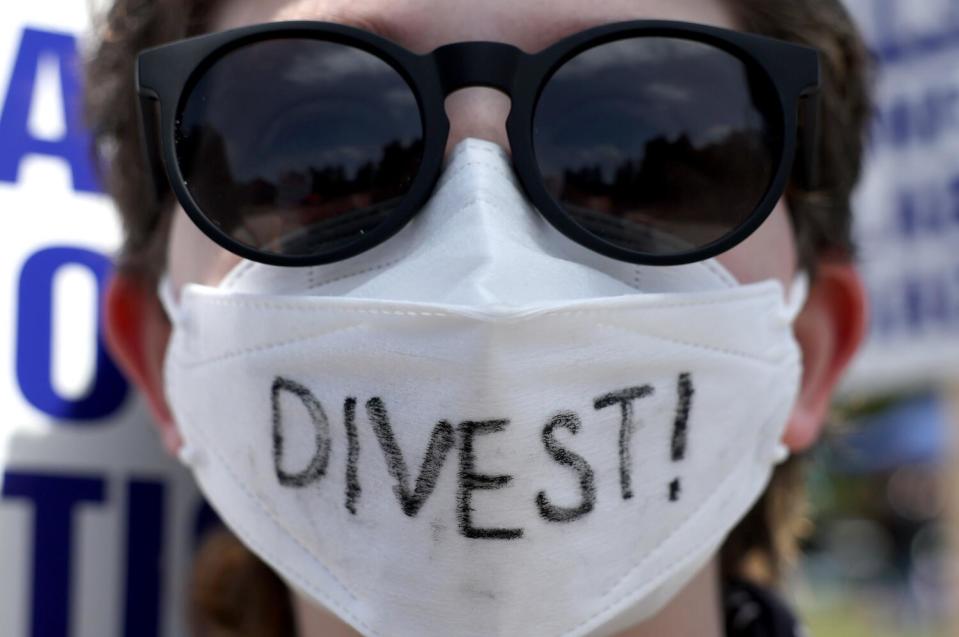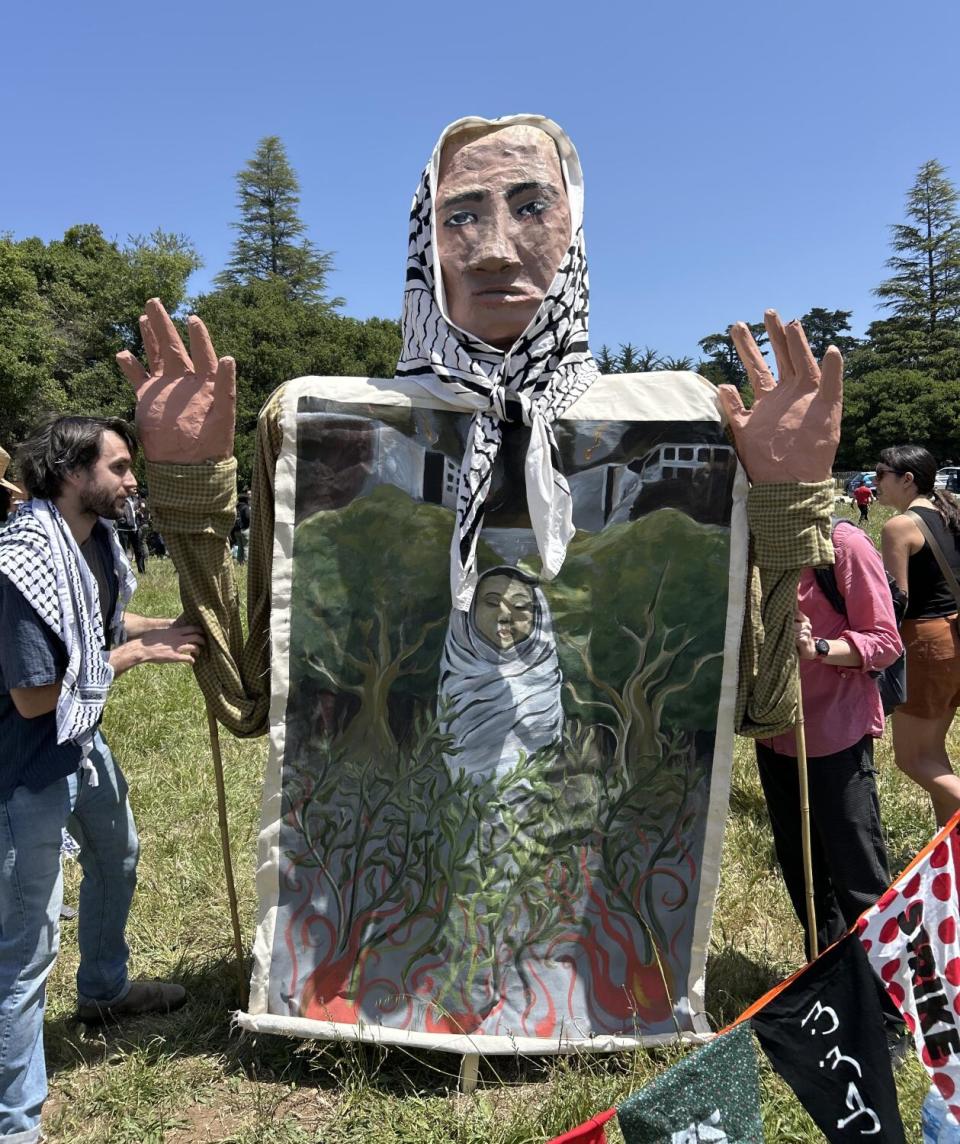UC academic workers' strike begins as pro-Palestinian activism enters new phase

Hundreds of academic workers at UC Santa Cruz became the first to walk off their jobs Monday, a rolling strike that immediately disrupted university operations as picketing union members forced classes online and restricted access to campus.
United Auto Workers Local 4811, the largest union in the UC system, represents 48,000 graduate student teaching assistants, tutors, researchers and other academic workers. Members voted to strike last week over alleged free speech violations and how the system leaders have cracked down on pro-Palestinian protests throughout campuses.
Citing "possible access challenges" on campus, university officials switched to remote instruction at noon Monday. A series of labor actions are expected to move across some of the 10 University of California campuses at the critical end of the term, with finals, coursework grading and commencement in the coming weeks, the academic workers' union said.
Jacob Fontana, the sergeant at arms for the student workers union, said classes that taught by graduate teaching assistants would be canceled until further notice and that many "faculty comrades" were refusing to teach in solidarity with the strikers.
On Monday afternoon, hundreds of graduate students massed near the main entrance to campus, blocking some vehicles as they held signs and chanted: "The workers united will never be defeated!"

Some beat empty water jugs as drums. Others hoisted an enormous, kaffiyeh-clad puppet with raised hands. Santa Cruz is a smaller UC campus of 19,764 students, with nearly 2,000 in graduate school.
"I am on strike because my people are being killed," said Dima, a graduate student in art who made the puppet and declined to give her last name, but said she was Lebanese.
Jack Davies, a striking 34-year-old graduate student studying the history of consciousness, said that, "at a minimum," he hoped "to send a message to university administrators here and elsewhere that they don't have carte blanche to silence and repress protesters."
Dueling accusations of labor violations
Rather than pay or benefit issues, this strike is based on the union's claim that the UC response to campus protests has amounted to unfair labor practices. They are demanding that UC officials negotiate with pro-Palestinian demonstrators, stop what they say are actions hostile toward nonviolent activists and grant amnesty to those facing disciplinary action related to the unrest.
“The rights of union members across the UC system are at stake, and workers on every campus are incensed by UC’s conduct and the violence it summoned against the Palestine solidarity protests of which we are a part,” Rebecca Gross, unit chair of UAW 4811 at UC Santa Cruz, said in a statement Monday. “Santa Cruz is proud to be the first campus to Stand Up, and other campuses will follow unless UC remedies these charges.”
The walkouts were authorized last week by 79% of the 19,780 members of the union who voted. The voter turnout amounted to 41% of the union membership. A graduate student leader on Monday said workers plan to strike through the end of the academic year.
University officials characterize the job action as illegal because the academic workers have a valid contract with a no-strike clause.
The strike authorization called for university officials to "commit to de-escalation and negotiate in good faith with protesters over their urgent moral concerns."

The union has cited the violent mob attack on a pro-Palestinian encampment at UCLA and subsequent arrests of union members when police moved in to clear the camp, calling the actions "an assault on our fundamental right to free expression." At UC Irvine last week, police arrested 47 protesters allegedly involved in taking over a building.
Read more: UC officials charge that academic workers' strike over pro-Palestinian protests is illegal
Fontana, 27, a graduate student in statistics, said the university's decision-making — such as allowing protesters, including graduate workers, to be shot by police officers' rubber bullets, arrested and threatened with suspension and expulsion — "flies in the face of decades of precedent and labor law."
Fontana, who participated in the 2022 graduate workers' strike, said the student code of conduct outlines several outcomes for strikers who are disciplined. The "worst-case scenario," he said, is that they could be expelled or have their employment terminated.
UC leaders filed their own state unfair labor practice charge against the union Friday, calling on the labor board to order student workers to “cease and desist” the walkout.
“This strike directly violates the [collective bargaining agreement’s] no strike clauses, and has no relation to UAW members’ employment with the university. Instead, as the UAW and its members’ communications make clear, UAW strikes to support protest activity surrounding the conflict in the Middle East,” UC said in its filing with the state’s labor board.
In a letter sent to graduate student workers on Wednesday, UC officials warned students against striking.
“Participating in the strike does not change, excuse or modify, an employee’s normal work duties or expectations. And, unlike a protected strike, you could be subject to corrective action for failing to perform your duties,” the unsigned letter from the UC office of the president said.
Threats of more walkouts
Over the weekend, the UAW 4811 Instagram page forecast potential next targets.
"UCLA next" said one post with an eyeball emoji, while other posts suggested UC Davis, UC Irvine and UC San Diego could be called into the rolling strike.
The union has not formally called for strikes at those campuses.
However, there could be independent action by workers that is not authorized by the union. Some members and pro-Palestinian campus groups have said they will go on strike or protest in support of academic workers in Santa Cruz.
Read more: 'Maximize chaos.' UC academic workers authorize strike, alleging rights violated during protests
Rafael Jaime, UAW Local 4811 co-president, said in a statement Monday that “the ball is in UC’s court — and the first step they need to take is dropping all criminal and disciplinary proceedings against our colleagues. ... The faster UC resolves this, the fewer people will have to walk off the job.”
Workers ratified their current contract in late 2022, winning significant pay increases and benefit improvements. The union argues that the strike is within its legal rights because it’s connected to an unfair labor practice charge workers filed in early May with the state’s labor board.
J. Felix De La Torre, general counsel for the labor board, said that a decision on the cease-and-desist order sought by the university could come early this week. He added that the labor board has also offered a mediator in an effort to help resolve the dispute.
During a rally Monday, Stefan Yong, a graduate student in history of consciousness, asked the crowd of strikers: "Who here is a little bit afraid?"
"Solidarity means not being afraid alone," he said before leading chants of, "Spread the strike!"

Muriam Haleh Davis, a history professor, told the crowd that "this strike is historic" and that "fighting for Palestine ... will bring about our own liberation."
For two weeks, students at UC Santa Cruz, including unionized graduate students, have maintained a pro-Palestinian encampment on campus in support of divestment from Israel. The strike comes as protesters and the university administration have indicated that they’ve reached a standstill.
Protest leaders said Thursday that they were “under imminent threat of police sweep” after they said the university gave them formal notice to “cease all camping activities on university property.”
The cancellation of classes just two weeks before finals begin at UC Santa Cruz is, for many, a disappointing end to the academic year.
“I’m not against it. I understand what they’re doing. … but as a student it’s definitely a bummer,” said Quinn Schoenberg, a junior in film and sound engineering.
Schoenberg, 21, said he was trying to speak with an advisor about what to do: He still has to write 5,000 words before the end of the quarter but has no idea who will grade his work.
Roxy Rodriguez, a freshman studying marine biology, said the campus library closed early Monday and that her Wi-Fi connection was bad during her class, which was conducted over Zoom.
"You don't get the full experience," said Rodriguez, 19, of San Diego.
Jesse Jonson, 19 and studying marine biology, said he is in "full support of the strike," though "we're not fully sure what it will mean for our grades."
UC Santa Cruz said in a statement Monday evening that the main entrance remained blocked and that in-person instruction was canceled "to support continued teaching and learning." It was unclear Monday how long classes would remain online.
"Our primary goal is to minimize the disruptive impact, especially given the many educational and research challenges that have affected students and researchers in recent years," the statement read.
By about 5 p.m., the number of workers on the picket line appeared to have diminished. Participants strung a giant sign across the main campus entrance — partially blocking vehicles — that read: "There are no universities left in Gaza."
Read more: UCLA Academic Senate rejects censure and 'no confidence' vote on Chancellor Gene Block
On Monday, pro-Palestinian protesters moved their encampment, previously near the bookstore, to a more visible space near an entrance to campus alongside picketers.
There were more than two dozen tents, with signs reading, "Long live the people's university" and "No one is free until we are all free." Students in kaffiyehs ate pizza from the strikers.
"We want to put more pressure on the UC," said a spokesperson for the encampment who gave a nickname, Shiv, and said she was a first-year politics major. "Now we're ready to move and to force them to pay attention to us."
Jaime, the union co-president and a doctoral candidate in UCLA’s English department, said that to resolve the strike, the union needs “to see a real commitment from the university to respect our rights to free speech and peaceful protest on campus.”
Student workers will receive $500 weekly in strike pay, or about 33% less than the average teaching assistant makes for a 20-hour work week, he said.
UCLA still reeling from protests
With tensions mounting across the UC system, embattled UCLA Chancellor Gene Block said in a statement Monday that he was "deeply sorry to see our community in so much pain."
Block said the university is continuing a criminal investigation into who carried out "the despicable attack" on pro-Palestinian protesters on April 30, as well as a review of campus safety protocols.
"I know there are many questions, and while we may not have or be able to share all of the answers right now, we are committed to getting you the facts that you seek and deserve," Block said.
Block will be testifying this week before a congressional committee investigating alleged antisemitism on college campuses. Block said he would insist that antisemitism, Islamophobia, anti-Arab hate and other forms of bigotry and hostility will "not be tolerated."
Block, who announced his retirement as chancellor last fall, said that, "in my final few months as chancellor, I am dedicated to doing all I can to address these challenges and help shepherd the process of rebuilding trust and dialogue within our community."
This story originally appeared in Los Angeles Times.


